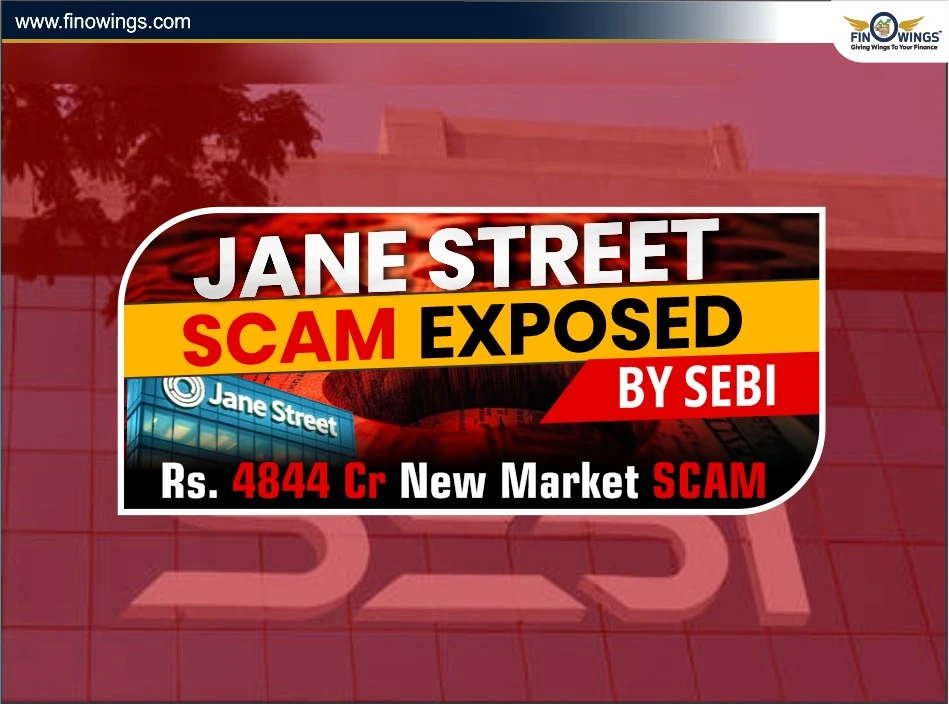Home >> Blog >> Jane Street Scam Exposed by SEBI: Rs. 4844 cr new Market Scam
Jane Street Scam Exposed by SEBI: Rs. 4844 cr new Market Scam

Table of Contents
Bringing to focus Jane Street, a global proprietary trading firm based in the US, the Securities and Exchange Board of India (SEBI) has initiated legal proceedings against them for what India’s SEBI termed ‘alleged market manipulation’.
The markets regulator has now barred Jane Street from operating in Indian markets, marking another ban on one of the largest trading firms, claiming them to be one of the highest “illegal gain” denominations labelled within the sordid history of reverse trading in India. This incident puts a spotlight on the steps that India is taking to actively defend the credibility of its markets and safeguard participants.
What is Jane Street?
A primary face in algorithmic and high-frequency trading around the globe, Jane Street stands as a quantitative trading company noted for its several divisions located in different parts of the world, including the now emerging Asia.
Jane Street operates on maths-based algorithms that serve multiple functions, such as executing trades on a large scale in equities, bonds, and also with derivatives. It is noteworthy that they have actively participated in the Indian derivatives market, especially the index options.
Click to open demat account
What are Jane Street Stocks?
The Jane Street Stocks list in various constituents is mentioned below-
JS Group purchases in the BANK NIFTY constituent stocks (cash market) during Patch I is shown below-
In the stock futures market
In the NIFTY constituent stock futures market
(Click for Source)
SEBI’s Allegations
The SEBI Jane Street news is gaining popularity on the internet. In this section, let's see the allegations imposed by SEBI.
-
Possible Manipulation of Bank Nifty and Nifty 50 Markets-
-
As alleged, Jane Street employed a two-phase expiry day flow strategy. During the first phase, they purchased large volumes of Bank Nifty's constituent stocks along with Bank Nifty futures contracts to ‘pump up’ the index. Consequently, they also shortened the index options. In the second phase, they unwound the position to capitalise on the profit from the decay of the options.
-
Jane Street was said to have “earned” over Rs. 36,500 crores (approx $4.3 billion) on index options during the period spanning January 2023 to March 2025.
-
As further detailed by SEBI, Jane Street purportedly transacted over Rs. 735 crores (£88 million) in a single day on January 17, 2024.
-
Breach of Fair Trade Activities-
-
SEBI highlighted what they alleged as ‘Intra Day Index Manipulation’ and ‘Extended Marking the Close’, where participants intentionally pushed the indices and sold just before the close to influence settlement values.
-
Jane Street is being accused of ignoring the National Stock Exchange of India's (NSE) April 2025 restrictions that were issued months prior.
-
Impact on Retail Investors-
-
SEBI's findings suggest an overwhelming 93% of retail derivatives traders have lost money due to these Jane Street schemes.
Why This Matters?
-
Protecting Retail Investors- This enforcement action illustrates SEBI's efforts to protect retail participation in India's rapidly growing derivatives market, which has become one of the largest in the world.
-
Global Traders Under Scrutiny- Even powerful global quant firms are not immune to facing harsh consequences for expiry-day manipulative trading.
-
Potential Rule Changes- To curb short-term speculative trading, SEBI is considering some other changes: fewer contract expiries, larger minimum lot sizes, and other contract terms.
Detailed Video
SEBI’s Actions Summary
-
Interim Ban: Jane Street and its Asian and Indian subsidiaries (including JSI Investments, Jane Street Singapore, Jane Street Asia Trading, etc.) are prohibited from trading in India.
-
Firms Restraining Order & Escrow Instruction: Ordered to place Rs. 4,843 crore and Rs. 4,844 crore into an escrow account, and the banks are restrained from debiting any payments without SEBI’s consent.
-
Closing Open Positions: Must reduce open derivative contracts within three months and cannot alter investment position without permission.
-
Appeals Rights: Jane Street has 21 days from the date of issuance to respond or appeal to the Securities Appellate Tribunal.
Jane Street's Response
Jane Street has publicly contested SEBI's findings, claiming it has adhered to all controlled conduct globally. The company has indicated that it intends to deepen its dialogue with the agency and has a 21-day period to file objections or contest the interim order at the Securities Appellate Tribunal.
Broader Market Implications and Impact on the Share Market
Since the Indian equity market, as represented by Nifty and Sensex, did not face any dramatic movement on July 4, an event attributed to this action, it must be noted that such happenings go into the conversations between traders and financial analysts.
If such decisive action is taken, it can restore some faith in the system so that an efficient market can work with proper mechanisms for price discovery and protect retail investors-mainly the backbone of the derivatives market, who are otherwise left unprotected in an unfair environment.
It also demonstrates concern for other suspected patterns of market manipulation that reside at more than one cross-section of the order book, indicating a move towards more open Indian capital markets.
Conclusion
Jane Street's case illustrates the significance of enforcement efforts directed at firms suspected of market abuse. This underscores the need for powerful deterrents to market manipulation. The course of this investigation will influence confidence in India's developing financial ecosystem.
Other Share Market Scam
Disclaimer: This blog does not give any buy or sell advice. It is only for informational purposes. Always discuss with an eligible financial advisor before investing.
Author
Frequently Asked Questions
Authorities in India suspended U.S. Securities trading firm Jane Street’s access to the local market and seized $567 million of its assets, saying an investigation found it manipulated stock indices through derivative positions.
In its 105-page order, SEBI accused Jane Street of IT-based manipulation of the Bank Nifty index, which consists of 12 top financial stocks and is often used for derivatives trading. As stated by SEBI, Jane Street implemented two primary trading methods over a span of two years that were intended to unjustly influence the Bank Nifty index.
SEBI has accused Jane Street of engaging in deceptive and manipulative trading activities in the Indian equity markets, particularly within the derivatives segments. This is part of a broader attempt to curb sophisticated algorithmic and high-frequency trading (HFT) strategies which could potentially harm retail investors by taking advantage of inefficiencies in the market.
















.webp)


